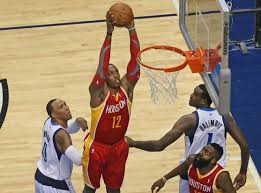CSN Houston Bankruptcy: Rockets Now Lead Affiliate Negotiator
The smarter way to stay on top of the multichannel video marketplace. Sign up below.
You are now subscribed
Your newsletter sign-up was successful

The Houston Astros have had their turn at the plate. Now, the Houston Rockets will get their chance to step to the line until early in 2014 and try to score carriage deals for the embattled regional sports network that airs the teams’ games.
That was the key takeaway from a Dec. 12 hearing in the bankruptcy proceedings involving Comcast SportsNet Houston. U.S. Bankruptcy Judge Marvin Isgur approved the NBA franchise moving into lead distribution negotiating role for CSN Houston, which only counts Comcast and a handful of smaller providers in the Houston DMA as affiliates within the RSN’s five-state trading area.
Astros owner Jim Crane had been serving in that capacity, after Isgur at an Oct. 29 hearing gave him six weeks to try and arrange a new business plan for the RSN. To that end, the Astros said that they have been engaged in negotiations with two major distributors, but they wanted to turn over those responsibilities to the Rockets in the wake of Comcast’s response to the MLB club’s civil suit against the MSO, alleging the construction of a fraudulent business place based on inflated monthly subscriber fees. Crane says the Astros have lost millions of dollars from CSN Houston.
The Rockets, which did not return a phone call seeking comment by press time, will now have until Jan. 7 to reach carriage contracts. The parties -- the Astros own 46% of CSN Houston, the Rockets 32% and Comcast/NBCU the balance -- will be kept abreast of the progress via weekly status updates.
Comcast/NBCU officials declined comment.
Attorneys for a group of Comcast subsidiaries on Dec. 9 filed amended motions to the Chapter 11 bankruptcy proceedings claiming that the Astros are unable to put the interests CSN Houston ahead of the MLB team and that the lawsuit versus Comcast, NBCUniversal and former Astros owner Drayton McClane had significantly damaged the interests of the network. They also asked the bankruptcy court again to move as quickly as possible on a motion to appoint an interim trustee to oversee a reorganized CSN Houston. Isgur, who also has not ruled on the Astros’ motion to dismiss the bankruptcy, instead now has allowed the Rockets to try and consummate affiliate contracts.
Houston Astros general counsel Giles Kibbe made this statement: “We have been engaged in negotiations with two major players and holding weekly meetings with the Rockets and Comcast to keep them apprised of the discussions. Comcast recently expressed concern with the Astros negotiations for the Network while our civil lawsuit is ongoing. Given the status of the negotiations with two major players, we would like for the Rockets to continue those discussions. We do not want there to be any question as to whether our lawsuit against Comcast has any bearing on the results of the negotiations with the other carriers.
The smarter way to stay on top of the multichannel video marketplace. Sign up below.
We are confident in what we have done to this point and we have handled this exactly as Judge Isgur requested and in the best interest of the Network,"Kibbe continued. "Our interests are aligned with the Rockets in that we both want our fans to view our games. As we have done throughout this entire process, we will both continue to work tirelessly toward getting the game on TV for all of our fans.”
While CSN Houston reaches 40% of the Houston DMA via Comcast and the smaller providers, DirecTV, Dish Network, Time Warner Cable, AT&T U-verse, Verizon FiOS and Suddenlink Communications all remain on the distribution sidelines in the nation's 10th largest DMA, as well as the rest of Texas, Louisiana, Arkansas, Oklahoma and New Mexico. As a result, the RSN, which has reportedly seeking a monthly subscriber fee of $3.40, has been unable to meet its rights-fee obligations to the Astros and the Rockets. Typically, RSN’s derive 80% of their revenue from subscriber fees.
At the request of the Rockets, which added the talented-but-temperamental Dwight Howard to its roster during the off-season, CSN Houston recently extended a 45-day freeview offer — a span that would have encompassed about two dozen of the club’s games — but it was met with deaf ears by the distributors and withdrawn. The Rockets currently sport a 15-7 record, fourth best in the Western Conference and sixth in all of the NBA.
On Sept. 27, four Comcast-related entities filed for an involuntary petition for Chapter 11 bankruptcy protection for the RSN. Houston SportsNet Finance, which loaned CSN Houston $100 million to build a studio and for start-up costs, indicated that it would be willing to buy the RSN. The Rockets have also expressed a similar sentiment.
Under the RSN's structure there has to be a voting unanimity among the parties -- the ballclubs have one piece, while Comcast/NBCU hold two -- on major operational decisions, notably affiliate agreements.
